研究生科技英语阅读课文翻译9
- 格式:doc
- 大小:52.50 KB
- 文档页数:5
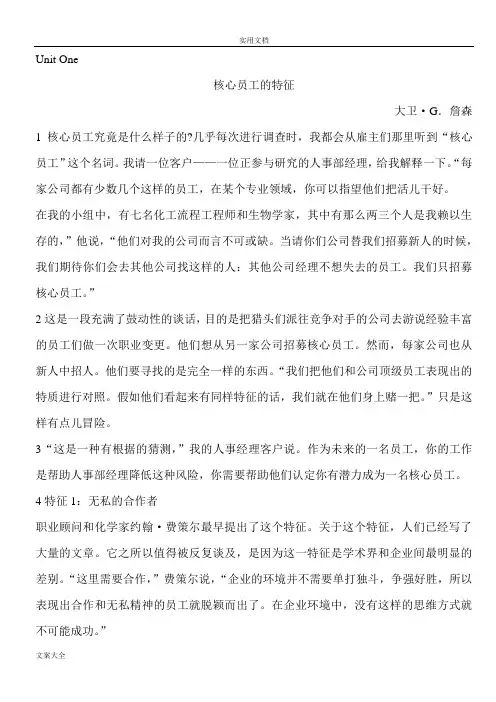
Unit One核心员工的特征大卫·G.詹森1核心员工究竟是什么样子的?几乎每次进行调查时,我都会从雇主们那里听到“核心员工”这个名词。
我请一位客户——一位正参与研究的人事部经理,给我解释一下。
“每家公司都有少数几个这样的员工,在某个专业领域,你可以指望他们把活儿干好。
在我的小组中,有七名化工流程工程师和生物学家,其中有那么两三个人是我赖以生存的,”他说,“他们对我的公司而言不可或缺。
当请你们公司替我们招募新人的时候,我们期待你们会去其他公司找这样的人:其他公司经理不想失去的员工。
我们只招募核心员工。
”2这是一段充满了鼓动性的谈话,目的是把猎头们派往竞争对手的公司去游说经验丰富的员工们做一次职业变更。
他们想从另一家公司招募核心员工。
然而,每家公司也从新人中招人。
他们要寻找的是完全一样的东西。
“我们把他们和公司顶级员工表现出的特质进行对照。
假如他们看起来有同样特征的话,我们就在他们身上赌一把。
”只是这样有点儿冒险。
3“这是一种有根据的猜测,”我的人事经理客户说。
作为未来的一名员工,你的工作是帮助人事部经理降低这种风险,你需要帮助他们认定你有潜力成为一名核心员工。
4特征1:无私的合作者职业顾问和化学家约翰·费策尔最早提出了这个特征。
关于这个特征,人们已经写了大量的文章。
它之所以值得被反复谈及,是因为这一特征是学术界和企业间最明显的差别。
“这里需要合作,”费策尔说,“企业的环境并不需要单打独斗,争强好胜,所以表现出合作和无私精神的员工就脱颖而出了。
在企业环境中,没有这样的思维方式就不可能成功。
”5许多博士后和研究生在进行这种过渡的过程中表现得相当费力。
因为生命中有那么长一段时间他们都在扮演一个独立研究者的角色,并且要表现得比其他年轻的优秀人才更出色。
你可以藉此提高在公司的吸引力:为追求一个共同的目标和来自其他实验室和学科的科学家们合作——并且为你的个人履历上的内容提供事迹证明。
这个方法,加上你在描述业绩时开明地使用代词“我们”,而不是“我”,能使公司对你的看法从“单干户”转变成“合作者”。
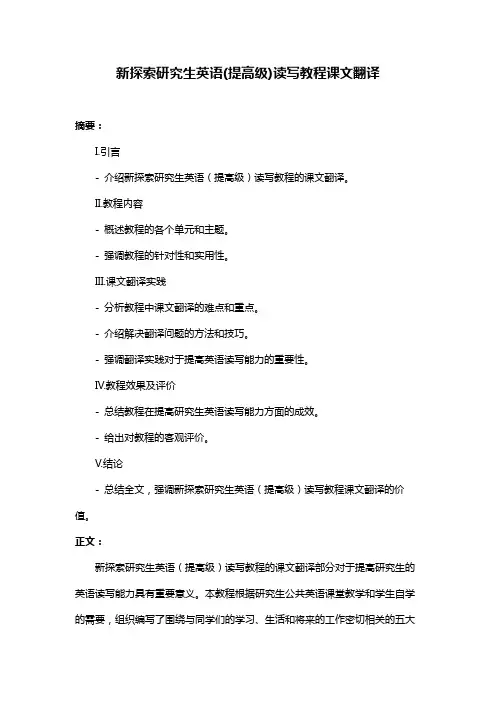
新探索研究生英语(提高级)读写教程课文翻译摘要:I.引言- 介绍新探索研究生英语(提高级)读写教程的课文翻译。
II.教程内容- 概述教程的各个单元和主题。
- 强调教程的针对性和实用性。
III.课文翻译实践- 分析教程中课文翻译的难点和重点。
- 介绍解决翻译问题的方法和技巧。
- 强调翻译实践对于提高英语读写能力的重要性。
IV.教程效果及评价- 总结教程在提高研究生英语读写能力方面的成效。
- 给出对教程的客观评价。
V.结论- 总结全文,强调新探索研究生英语(提高级)读写教程课文翻译的价值。
正文:新探索研究生英语(提高级)读写教程的课文翻译部分对于提高研究生的英语读写能力具有重要意义。
本教程根据研究生公共英语课堂教学和学生自学的需要,组织编写了围绕与同学们的学习、生活和将来的工作密切相关的五大主题:人文与社科、经济与管理、生命与健康、科学与技术、环境与能源。
教程课文翻译实践分析了教程中课文翻译的难点和重点,介绍解决翻译问题的方法和技巧,强调翻译实践对于提高英语读写能力的重要性。
教程中的课文翻译涵盖了各个学科专业,内容新颖、时效性强、具有批判性和语言的规范性,能够激发学生的兴趣并引起学生展开讨论。
此外,教程还注重培养学生的独立思考能力和团队合作精神,通过课文翻译实践,让学生学会如何准确、流畅地表达观点和想法。
新探索研究生英语(提高级)读写教程课文翻译部分在提高研究生英语读写能力方面成效显著。
经过一定时间的实践和学习,研究生们在英语表达能力和阅读理解能力上都有了明显的提高。
总体来说,教程在内容设置、教学方法等方面都表现出较高的质量,值得推广和应用。
总之,新探索研究生英语(提高级)读写教程课文翻译为学生提供了一个实用的英语学习平台,帮助他们在学术研究和未来工作中更好地运用英语。
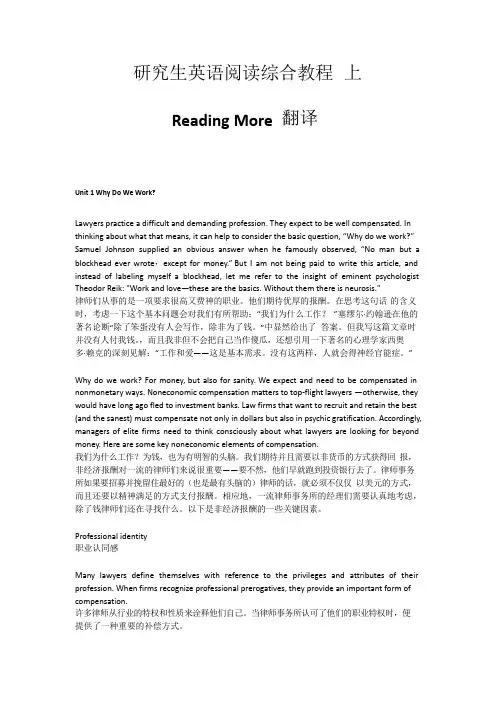
研究生英语阅读综合教程上Reading More翻译Unit1Why Do We Work?Lawyers practice a difficult and demanding profession.They expect to be well compensated.In thinking about what that means,it can help to consider the basic question,“Why do we work?”Samuel Johnson supplied an obvious answer when he famously observed,“No man but a blockhead ever wrote,except for money.”But I am not being paid to write this article,and instead of labeling myself a blockhead,let me refer to the insight of eminent psychologist Theodor Reik:"Work and love—these are the basics.Without them there is neurosis."律师们从事的是一项要求很高又费神的职业。
他们期待优厚的报酬。
在思考这句话的含义时,考虑一下这个基本问题会对我们有所帮助:“我们为什么工作?”塞缪尔·约翰逊在他的著名论断“除了笨蛋没有人会写作,除非为了钱。
”中显然给出了答案。
但我写这篇文章时并没有人付我钱。
,而且我非但不会把自己当作傻瓜,还想引用一下著名的心理学家西奥多·赖克的深刻见解:“工作和爱——这是基本需求。
没有这两样,人就会得神经官能症。
”Why do we work?For money,but also for sanity.We expect and need to be compensated in nonmonetary ways.Noneconomic compensation matters to top-flight lawyers—otherwise,they would have long ago fled to investment w firms that want to recruit and retain the best (and the sanest)must compensate not only in dollars but also in psychic gratification.Accordingly, managers of elite firms need to think consciously about what lawyers are looking for beyond money.Here are some key noneconomic elements of compensation.我们为什么工作?为钱,也为有明智的头脑。
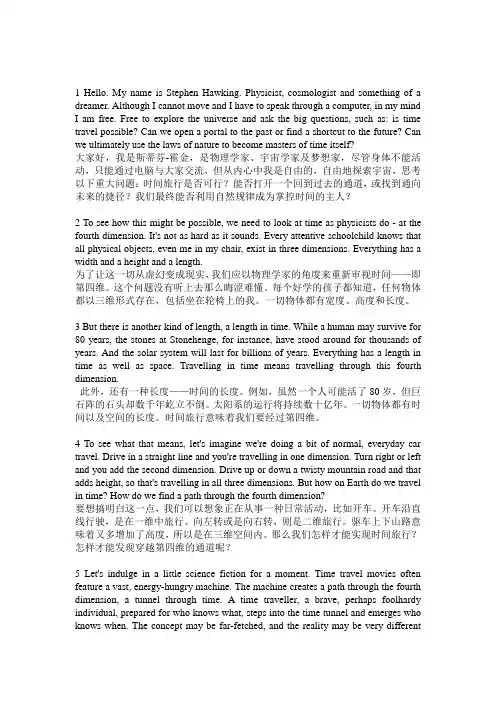
1 Hello. My name is Stephen Hawking. Physicist, cosmologist and something of a dreamer. Although I cannot move and I have to speak through a computer, in my mind I am free. Free to explore the universe and ask the big questions, such as: is time travel possible? Can we open a portal to the past or find a shortcut to the future? Can we ultimately use the laws of nature to become masters of time itself?大家好,我是斯蒂芬-霍金,是物理学家、宇宙学家及梦想家,尽管身体不能活动,只能通过电脑与大家交流,但从内心中我是自由的,自由地探索宇宙,思考以下重大问题:时间旅行是否可行?能否打开一个回到过去的通道,或找到通向未来的捷径?我们最终能否利用自然规律成为掌控时间的主人?2 To see how this might be possible, we need to look at time as physicists do - at the fourth dimension. It's not as hard as it sounds. Every attentive schoolchild knows that all physical objects, even me in my chair, exist in three dimensions. Everything has a width and a height and a length.为了让这一切从虚幻变成现实,我们应以物理学家的角度来重新审视时间——即第四维。
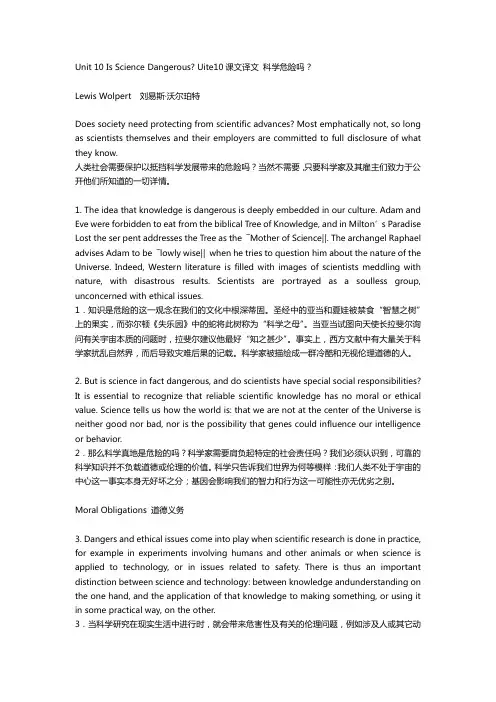
Unit 10 Is Science Dangerous? Uite10课文译文科学危险吗?Lewis Wolpert 刘易斯·沃尔珀特Does society need protecting from scientific advances? Most emphatically not, so long as scientists themselves and their employers are committed to full disclosure of what they know.人类社会需要保护以抵挡科学发展带来的危险吗?当然不需要,只要科学家及其雇主们致力于公开他们所知道的一切详情。
1. The idea that knowledge is dangerous is deeply embedded in our culture. Adam and Eve were forbidden to eat from the biblical Tree of Knowledge, and in Milton’s Paradise Lost the ser pent addresses the Tree as the ―Mother of Science‖. The archangel Raphael advises Adam to be ―lowly wise‖when he tries to question him about the nature of the Universe. Indeed, Western literature is filled with images of scientists meddling with nature, with disastrous results. Scientists are portrayed as a soulless group, unconcerned with ethical issues.1.知识是危险的这一观念在我们的文化中根深蒂固。
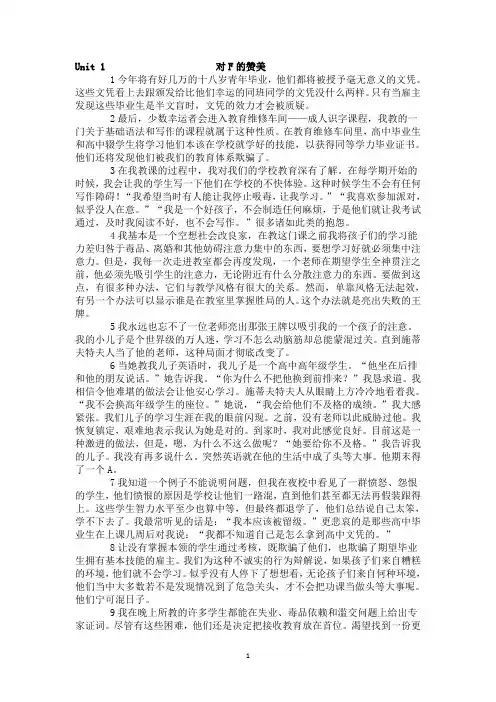
Unit 1 对F的赞美1今年将有好几万的十八岁青年毕业,他们都将被授予毫无意义的文凭。
这些文凭看上去跟颁发给比他们幸运的同班同学的文凭没什么两样。
只有当雇主发现这些毕业生是半文盲时,文凭的效力才会被质疑。
2最后,少数幸运者会进入教育维修车间——成人识字课程,我教的一门关于基础语法和写作的课程就属于这种性质。
在教育维修车间里,高中毕业生和高中辍学生将学习他们本该在学校就学好的技能,以获得同等学力毕业证书。
他们还将发现他们被我们的教育体系欺骗了。
3在我教课的过程中,我对我们的学校教育深有了解。
在每学期开始的时候,我会让我的学生写一下他们在学校的不快体验。
这种时候学生不会有任何写作障碍!“我希望当时有人能让我停止吸毒,让我学习。
”“我喜欢参加派对,似乎没人在意。
”“我是一个好孩子,不会制造任何麻烦,于是他们就让我考试通过,及时我阅读不好,也不会写作。
”很多诸如此类的抱怨。
4我基本是一个空想社会改良家,在教这门课之前我将孩子们的学习能力差归咎于毒品、离婚和其他妨碍注意力集中的东西,要想学习好就必须集中注意力。
但是,我每一次走进教室都会再度发现,一个老师在期望学生全神贯注之前,他必须先吸引学生的注意力,无论附近有什么分散注意力的东西。
要做到这点,有很多种办法,它们与教学风格有很大的关系。
然而,单靠风格无法起效,有另一个办法可以显示谁是在教室里掌握胜局的人。
这个办法就是亮出失败的王牌。
5我永远也忘不了一位老师亮出那张王牌以吸引我的一个孩子的注意。
我的小儿子是个世界级的万人迷,学习不怎么动脑筋却总能蒙混过关。
直到施蒂夫特夫人当了他的老师,这种局面才彻底改变了。
6当她教我儿子英语时,我儿子是一个高中高年级学生。
“他坐在后排和他的朋友说话。
”她告诉我。
“你为什么不把他换到前排来?”我恳求道。
我相信令他难堪的做法会让他安心学习。
施蒂夫特夫人从眼睛上方冷冷地看着我。
“我不会换高年级学生的座位。
”她说,“我会给他们不及格的成绩。
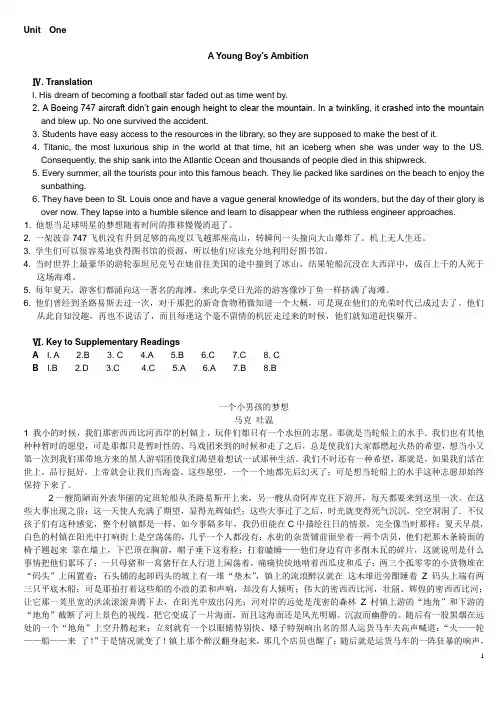
Unit OneA Young Boy’s AmbitionⅣ. Translationl. His dream of becoming a football star faded out as time went by.2. A Boeing 747 aircraft didn’t gain enough height to clear the mountain. In a twinkling, it crashed into the mountainand blew up. No one survived the accident.3. Students have easy access to the resources in the library, so they are supposed to make the best of it.4. Titanic, the most luxurious ship in the world at that time, hit an iceberg when she was under way to the US.Consequently, the ship sank into the Atlantic Ocean and thousands of people died in this shipwreck.5. Every summer, all the tourists pour into this famous beach. They lie packed like sardines on the beach to enjoy thesunbathing.6. They have been to St. Louis once and have a vague general knowledge of its wonders, but the day of their glory isover now. They lapse into a humble silence and learn to disappear when the ruthless engineer approaches.1. 他想当足球明星的梦想随着时间的推移慢慢消退了。
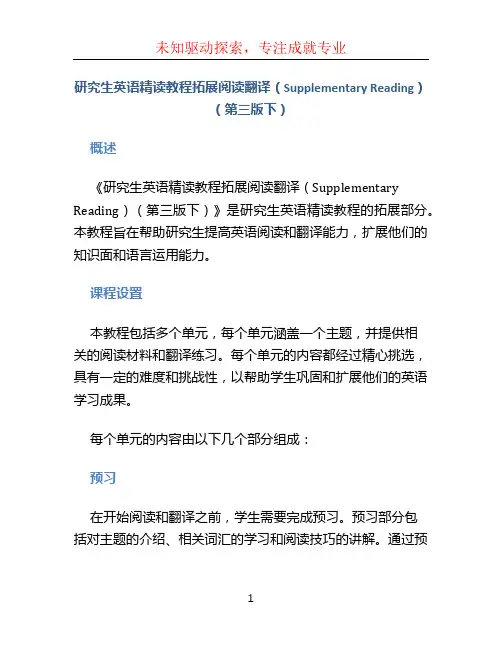
研究生英语精读教程拓展阅读翻译(Supplementary Reading)(第三版下)概述《研究生英语精读教程拓展阅读翻译(Supplementary Reading)(第三版下)》是研究生英语精读教程的拓展部分。
本教程旨在帮助研究生提高英语阅读和翻译能力,扩展他们的知识面和语言运用能力。
课程设置本教程包括多个单元,每个单元涵盖一个主题,并提供相关的阅读材料和翻译练习。
每个单元的内容都经过精心挑选,具有一定的难度和挑战性,以帮助学生巩固和扩展他们的英语学习成果。
每个单元的内容由以下几个部分组成:预习在开始阅读和翻译之前,学生需要完成预习。
预习部分包括对主题的介绍、相关词汇的学习和阅读技巧的讲解。
通过预习,学生可以提前了解课文的背景和内容,有助于他们更好地理解和应用课文中的知识。
阅读阅读部分提供了相关的阅读材料,包括但不限于科技、文化、教育、社会等领域的文章。
这些文章既有经典文献,也有当代热点话题。
通过阅读这些文章,学生可以拓宽自己的知识面,学习新的表达方式和句子结构,并培养批判性思维能力。
翻译翻译部分是本教程的重点内容。
通过对阅读材料的翻译练习,学生可以提高自己的翻译能力。
翻译练习包括中译英和英译中两种形式,旨在培养学生在不同语境下的翻译技巧和思维方式。
讨论讨论部分提供了一系列问题,旨在引导学生对课文内容进行思考和讨论。
通过与同学的交流和互动,学生可以更深入地理解课文,发现不同的观点和思维方式,并提高自己的表达能力。
扩展阅读扩展阅读部分提供了相关的推荐阅读材料,供学生自主阅读和拓展。
这些材料既可以是与主题相关的经典著作,也可以是最新的研究成果。
通过扩展阅读,学生可以进一步扩大自己的阅读广度和深度。
课后练习每个单元结束时,都会提供一些课后练习,旨在巩固学生对课文的理解和应用能力。
这些练习包括选择题、填空题、翻译练习等,可以帮助学生检验自己的学习成果,并发现不足之处。
教学方法本教程采用多种教学方法和手段,旨在激发学生的学习兴趣和主动性。
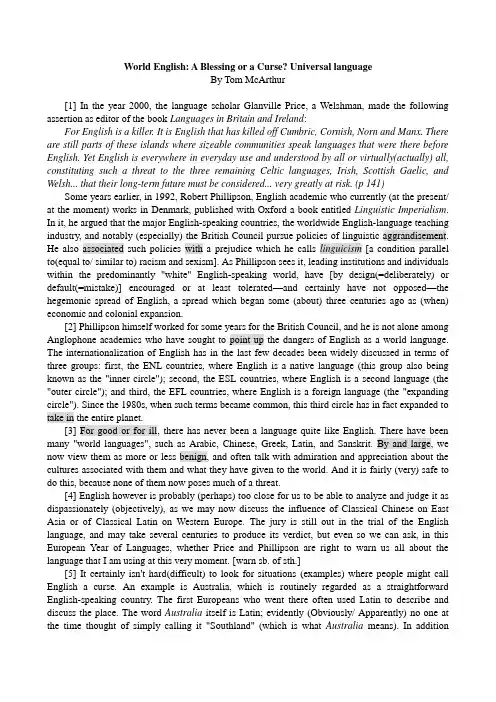
World English: A Blessing or a Curse? Universal languageBy Tom McArthur[1] In the year 2000, the language scholar Glanville Price, a Welshman, made the following assertion as editor of the book Languages in Britain and Ireland:For English is a killer. It is English that has killed off Cumbric, Cornish, Norn and Manx. There are still parts of these islands where sizeable communities speak languages that were there before English. Yet English is everywhere in everyday use and understood by all or virtually(actually) all, constituting such a threat to the three remaining Celtic languages, Irish, Scottish Gaelic, and Welsh... that their long-term future must be considered... very greatly at risk. (p 141) Some years earlier, in 1992, Robert Phillipson, English academic who currently (at the present/ at the moment) works in Denmark, published with Oxford a book entitled Linguistic Imperialism. In it, he argued that the major English-speaking countries, the worldwide English-language teaching industry, and notably (especially) the British Council pursue policies of linguistic aggrandisement. He also associated such policies with a prejudice which he calls linguicism[a condition parallel to(equal to/ similar to) racism and sexism]. As Phillipson sees it, leading institutions and individuals within the predominantly "white" English-speaking world, have [by design(=deliberately) or default(=mistake)] encouraged or at least tolerated—and certainly have not opposed—the hegemonic spread of English, a spread which began some (about) three centuries ago as (when) economic and colonial expansion.[2] Phillipson himself worked for some years for the British Council, and he is not alone among Anglophone academics who have sought to point up the dangers of English as a world language. The internationalization of English has in the last few decades been widely discussed in terms of three groups: first, the ENL countries, where English is a native language (this group also being known as the "inner circle"); second, the ESL countries, where English is a second language (the "outer circle"); and third, the EFL countries, where English is a foreign language (the "expanding circle"). Since the 1980s, when such terms became common, this third circle has in fact expanded to take in the entire planet.[3] For good or for ill, there has never been a language quite like English. There have been many "world languages", such as Arabic, Chinese, Greek, Latin, and Sanskrit. By and large, we now view them as more or less benign, and often talk with admiration and appreciation about the cultures associated with them and what they have given to the world. And it is fairly (very) safe to do this, because none of them now poses much of a threat.[4] English however is probably (perhaps) too close for us to be able to analyze and judge it as dispassionately (objectively), as we may now discuss the influence of Classical Chinese on East Asia or of Classical Latin on Western Europe. The jury is still out in the trial of the English language, and may take several centuries to produce its verdict, but even so we can ask, in this European Year of Languages, whether Price and Phillipson are right to warn us all about the language that I am using at this very moment. [warn sb. of sth.][5] It certainly isn't hard(difficult) to look for situations (examples) where people might call English a curse. An example is Australia, which is routinely regarded as a straightforward English-speaking country. The first Europeans who went there often used Latin to describe and discuss the place. The word Australia itself is Latin; evidently (Obviously/ Apparently) no one at the time thought of simply calling it "Southland" (which is what Australia means). In addition(besides), in South Australia there is a wide stretch of land called the Nullarbor Plains, the first word of which sounds Aboriginal, but nullarbor is Latin and means "no trees". And most significantly of all, the early settlers called the continent a terra nullius. According to the Encarta World English Dictionary (1999) the Latin phrase terra nullius means:... the idea and legal concept that when the first Europeans arrived in Australia the land was owned by no one and therefore open to settlement. It has been judged not to be legally valid.But that judgment was made only recently. When the Europeans arrived, Australia was thinly populated—but populated nonetheless (from then on)—from coast to coast in every direction. There were hundreds of communities and languages. Many of these languages have died out, many more are in the process of dying out, and these dead and dying languages have been largely replaced (substituted) by either kinds of pidgin English or general Australian English. Depending on your point of view, this is either a tragic loss or the price of progress.[6] At the same time, however, can the blame for the extinction of Aboriginal languages be laid specifically at the door of English? The first Europeans to discover Australia were Dutch, and their language might have become the language of colonization and settlement. Any settler language could have had the same effect. If for example the Mongols had sustained their vast Eurasian empire, Mongolian might have become a world language and gone to Australia. Again, if history had been somewhat (a little) different, today's world language might have been Arabic, a powerful language in West Asia and North Africa that currently affects many smaller languages, including Coptic and Berber. Spanish has adversely (negatively) affected indigenous languages in so-called "Latin" America, and Russian has spread from Europe to the Siberian Pacific. If English is a curse and a killer, it may only be so in the sense (meaning) that any large language is likely (possible) to influence and endanger smaller languages.[7] Yet many people see (consider/ regard) English as a blessing. Let me leave aside here the obvious advantages possessed by any world language, such as a large communicative network, a strong literary and media complex (network), and a powerful cultural and educational apparatus (organization). Let us instead look at something rather different: the issue (problem) of politics, justice, and equality. My object (target) lesson this time is South Africa. Ten years ago, South Africa ceased (stopped) to be governed on principles of racial separateness, a system known in Afrikaans (a language derived from Dutch) as apartheid. The system arose (occurred) because the Afrikaner community—European settlers of mainly Dutch descent—saw themselves as superior to the indigenous (native) people of the land they had colonized.[8] English-speaking South Africans of British descent were not particularly strong in opposing the apartheid regime (rule), and the black opposition, whose members had many languages, was at first weak and disorganized. However, the language through which this opposition gained (obtained/ got) strength and organization was English, which became for them the key language of freedom and unity, not of oppression. There are today eleven official languages in South Africa—English, Afrikaans, and nine vernacular languages that include Zulu, Ndebele, and Setswana. But which of these nine do black South Africans use (or plan to use) as their national lingua franca? Which do they wish their children to speak and write successfully (in addition to their mother tongues)? The answer is none of the above. They want English, and in particular (especially/ specifically) they want a suitably Africanized English.[9] So, a curse for the indigenous peoples of Australia and something of a blessing for those in South Africa...[10] How then should we think of English in our globalizing world with its endangered diversities? The answer, it seems to me, is crystal clear. Like many things, English is at times (often) a blessing and at times a curse—for individuals, for communities (society), for nations, and even for unions of nations. The East Asian symbolism of yin and yang might serve (illustrate) well here: There is something of yang in every yin, of yin in every yang. Although they are opposites, they belong together: in this instance (case) within the circle of communication. Such symbolism suggests (shows) that the users of the world's lingua franca should seek to benefit as fully as possible from the blessing and as far as possible avoid invoking the curse. (1, 292 words)ABOUT THE AUTHORDr. Tom McArthur is founder editor of the Oxford Companion to the English Language (1992) and the quarterly English Today: The International Review of the English Language (Cambridge, 1985—). His more than 20 published works include the Longman Lexicon of Contemporary English (1981), Worlds of Reference: Language, Lexicography and Learning from the Clay Tablet to the Computer (1986), and The English Languages (1998). He is currently Deputy Director of the Dictionary Research Center at the University of Exeter.EXERCISESI. Reading ComprehensionAnswer the following questions or complete the, following statements.1. It can be inferred from Glanville Price's statement that he is ______.A. happy that English is everywhere in Britain and IrelandB. worried about the future of the remaining Celtic languagesC. shocked by the diversity of languages in Britain and IrelandD. amazed that many people in the UK still speak their Aboriginal languages2. Cumbric is used as an example of ______.A. a local dialectB. a victim of the English languageC. a language that is on the verge of extinctionD. a language that is used by only a limited number of people3. Which of the following is the major concern of the book Linguistic Imperialism?A. English teaching overseas.B. British government's language policies.C. Dominance of English over other languages.D. The role of English in technology advancement.4. Both Price and Phillipson are ______.A. government officialsB. advocates of linguistic imperialismC. in support of language policies carried out by the British CouncilD. concerned about the negative effect of English on smaller languages5. According to the text, the EFL countries ______.A. are large in numberB. is known as the "outer circle"C. will be endangered by EnglishD. have made English their official language6. According to McArthur, Chinese is different from English in that ______.A. it has made a great contribution to the worldB. it has had positive influence on other languagesC. it may result in the disappearance of other languagesD. it probably will not endanger the existence of other languages7. When he said the jury is out in the trial" (Line 3, Paragraph 4), McArthur meant ______.A. punishment is dueB. the jury is waiting for a trialC. no decision has been made yetD. there is no one to make the decision8. Australia might be used as an example to show that ______.A. languages are changing all the timeB. some English words are derived from LatinC. English has promoted the progress of some nationsD. English should be blamed for the extinction of smaller languages9. Many people see English as a blessing for people in ______.A. AustraliaB. East AsiaC. South AfricaD. ESL countries10. The main theme of this speech is that ______.A. English should be taught worldwideB. English as a world language does more harm than goodC. we should be objective to the internationalization of EnglishD. we should be aware of (realize) the danger of English as a world languageB. Questions on global understanding and logical structures1. Why does McArthur introduce Glanville Price and Robert Phillipson's points of view on the spread of English? What is his? Intention?McArthur quotes Price’s assertion and cites Pillipson’s viewpoint on the spread of English as sort of cons to initiate his argument. Cons are usually popularly believed arguments or opinions that are against the author’s point of view. Cons are c ommonly used writing techniques and are often employed in order to appeal the audience and highlight the author’sviewpoint.2. Does McArthur agree with what Price and Phillipson argued? From as early as which section does McArthur show his attitude? Toward the dominance of English as a world English?No. McArthur’s opinion is different from Price and Pillipson’s arguments. He doesn’t believe that English is a killer and should be blamed for the extinction of smaller languages. He sees English as both a blessing and a curse, maybe as a blessing more than a curse. After introducing Price and Pillipson’s viewpoints, McArthur writes about his own ideas on the issue of English as a world language. From the sentence “For good or for ill, there has never been a language quite like English”, we can learn that McArthur does not curse English like Price and Pillipson and he has a different point of view.3. By reading "It certainly isn't hard to look for situations where people might call English a curse", could we conclude that McArthur believes English is a curse?No. This sentence is a kind of justification. Although McArthur literally justifies the fact that there are situations where people might call English a curse, he doesn’t believe that English is virtua lly a curse. By adding the word “certainly” McArthur shows his intent.4. Could you pick up some words and expressions that signal change or continuation in McArthur's thought?“For good or for ill”(paragraph 3) /“however”(paragraph 4) /“But”(paragraph 5) / “At the same time, however”(paragraph 6) /“Yet”(paragraph 7)5. How many parts can this speech be divided? How are the parts organized?Part One: paragraphs 1 and 2. These two paragraphs introduce the situation that many academics argue against English as a world language.Part Two: paragraphs 3, 4, 5, 6, 7, 8, and 9. Paragraph three is a transitional paragraph that initiates McArthur’s own argument. In these paragraphs McArthur argues that English is not only a curse as many people have believed, but a blessing as well.Part Three: paragraph 10. McArthur concludes in the last paragraph that English may be a curse or a blessing depends on different situations and we should make advantages of world languages and avoid their disadvantages.II. VocabularyA. Choose the best word from the four choices to complete each of the following sentences.1. There has been much opposition from some social groups, ______ from the farming community.A. straightforwardlyB. notably(especially)C. virtuallyD. exceptionally2. The ______ view in Britain and other Western countries associates aging with decline, dependency, isolation, and often poverty (property).A. predominantB. credulousC. inclusive(<->exclusive)D. sustainable3. But gifts such as these cannot be awarded to everybody, either by judges or by the most ___ of governments./ reward rewarding [a gifted / talented person]A. toughB. demandingC. diverseD. benign (kind)4. The foreman read the ______ of guilty fourteen times, one for each defendant.A. prejudiceB. verificationC. verdictD. punishment5. They fear it could have a(n) ______ effect on global financial markets.A. sizeableB. adverse(negative)C. beneficialD. consequential6. The UN threatened to ______ economic sanctions if the talks were broken off.A. engageB. pursueC. abandon/ abundantD. invoke7. There are at least four crucial differences between the new ______ and the old government.A. regimeB. hegemonyC. complexD. federation/ fedal<->federal, confederate)8. These questions ______ a challenge to established attitude of superiority toward the outside world.A. evolveB. constituteC. tolerateD. aroused9. Because of this, a strong administrative ______ was needed to plan the use of scarce resources, organize production and regulate distribution.A. apparatusB. constitutionC. insistenceD. promotion10. I learnt that there are no genuinely ______ animals in this area, all the animals were brought here from other places.A. endangeredB. domesticated (tamed)C. indigenousD. extinctB. Choose the hest word or expression from the list given for each Honk Use each word or expression only once and make proper changes where necessary.point up by and large take in descent for good or illleave aside crystal clear die out endanger lay... at the door of1. The book concludes with a review of the possible impact (influence) of more intimate computers for good or ill, in various areas of human life.2. Moreover, it had become clear from the opinion polls that the unpopularity of the new tax was being laid at the door of the government which had introduced it, rather than the local authorities who were responsible for levying and collecting it.3. This case gave the example of breaking someone's arm: that is a really serious injury, but one which is unlikely to endanger the victim's life.4. Many of those who hold it live in poor areas and some are Colored, that is (=i.e./ namely), of mixed European and African descent.5. This debate is important because that "the facts" are not6. In the beginning, the meaning of life might be debated, but once past the first period, many of the conversations follow a well-worn route from one topic to the next and back again, taking in most of human life. [worn-out]7. But since agriculture forms the basis (base) of our industry, it was, by and large (on the whole), also an intensification of the crisis in the national economy in general.8. Let us factors such as education, career structure, pay and9. It is true that the exact nature of this issue is uncertain. However, one thing is crystal clear: it will not endanger the planet and its inhabitants. (habitat)10. But if animal populations are too small, then they simply die out.III. ClozeThere are ten blanks in the following passage. Read the passage carefully and choose the best answer from the four choices given for each blank. [(criterion) criteria: (1)semantic/(2)grammatical]A simplified form of the English language based on 850 key words was developed in the late 1920s by the English psychologist Charles Kay Ogden and 1 by the English educator I. A. Richards. Known as Basic English, it was used mainly to teach English to non-English-speaking persons and 2 as an international language. The complexities of English spelling and grammar, however, were major 3 to the adoption of Basic English as a second language.The fundamental principle of Basic English was that any idea, 4 complex, may be reduced to simple units of thought and expressed clearly by a limited number of everyday words. The 850-word primary vocabulary was 5 600 nouns (representing things or events), 150 adjectives (for qualities and _ 6 ), and 100 general "operational" words, mainly verbs and prepositions. Almost all the words were in 7 use in English-speaking countries. More than 60 percent of them were one-syllable words. The basic vocabulary was created 8 by eliminating numerous words which have the same or similar meanings and by 9 the use of 18 "basic" verbs, such as make, get, do, have, and be. These verbs were generally combined with prepositions, such as up, among, under, in, and forward. For example, a Basic English student would use the expression “go up”10 "ascend".1. A. created B. publicized C. invented D. operated2. A. proved B. provided C. projected D. promoted3. A. advantages B. objections C. obstacles D. facileties4. A. however B. whatever C. wherever D. whenever5. A. comprised of B. made of C. composed of D. constituted of6. A. personalities B. properties C. preferences D. perceptions/ perceive)7. A. common B. ordinary C. average D. nonprofessional8. A. in all B. at times C. for good D. in part/ partially)9. A. experiencing B. exchanging C. excluding D. extending10. A. in spite of =despite B. in favor of C. instead of D. in case ofII. TranslationPut the following passages into Chinese.1. For English is a killer. It is English that has killed off Cumbric, Cornish, Norn and Manx. There are still parts of these islands where sizeable communities speak languages that were there before English. Yet English is everywhere in everyday use and understood by all or virtually all, constituting such a threat to the three remaining Celtic languages, Irish, Scottish Gaelic, and Welsh... that their long-term future must be considered... very greatly at risk.因为英语是个杀手。
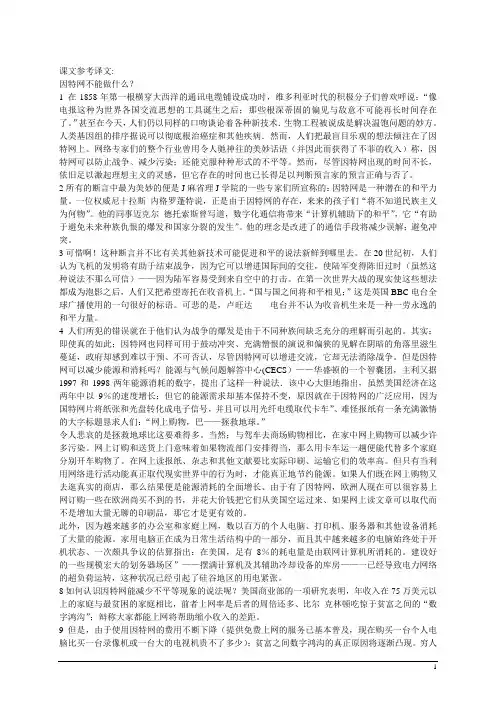
课文参考译文:因特网不能做什么?1 在1858年第一根横穿大西洋的通讯电缆铺设成功时,维多利亚时代的积极分子们曾欢呼说:“像电报这种为世界各国交流思想的工具诞生之后;那些根深蒂固的偏见与敌意不可能再长时间存在了。
”甚至在今天,人们仍以同样的口吻谈论着各种新技术.生物工程被说成是解决温饱问题的妙方。
人类基因组的排序据说可以彻底根治癌症和其他疾病.然而,人们把最盲目乐观的想法倾注在了因特网上。
网络专家们的整个行业曾用令人驰神往的美妙话语(并因此而获得了不菲的收入)称,因特网可以防止战争、减少污染;还能克服种种形式的不平等。
然而,尽管因特网出现的时间不长,依旧足以激起理想主义的灵感,但它存在的时间也已长得足以判断预言家的预言正确与否了。
2所有的断言中最为美妙的便是J麻省理J学院的一些专家们所宣称的:因特网是一种潜在的和平力量。
一位权威尼十拉斯内格罗蓬特说,正是由于因特网的存在,来来的孩子们“将不知道民族主义为何物”。
他的同事迈克尔德托索斯曾写道,数字化通信将带来“计算机辅助下的和平”,它“有助于避免未来种族仇恨的爆发和国家分裂的发生”。
他的理念是改进了的通信手段将减少误解;避免冲突。
3可惜啊!这种断言并不比有关其他新技术可能促进和平的说法新鲜到哪里去。
在20世纪初,人们认为飞机的发明将有助于结束战争,因为它可以增进国际间的交往,使陆军变得陈旧过时(虽然这种说法不那么可信)——因为陆军容易受到来自空中的打击。
在第一次世界大战的现实使这些想法都成为泡影之后,人们又把希望寄托在收音机上。
“国与国之间将和平相见;”这是英国BBC电台全球广播使用的一句很好的标语。
可悲的是,卢旺达电台并不认为收音机生来是一种一劳永逸的和平力量。
4 人们所犯的错误就在于他们认为战争的爆发是由于不同种族间缺乏充分的理解而引起的。
其实;即使真的如此;因特网也同样可用于鼓动冲突、充满憎恨的演说和偏狭的见解在阴暗的角落里滋生蔓延,政府却感到难以于预、不可否认,尽管因特网可以增进交流,它却无法消除战争。

新世纪研究生公共英语教材阅读A翻译及答案Unit 1 ............................................................................................................................ 错误!未定义书签。
Unit 2 ............................................................................................................................ 错误!未定义书签。
Unit 3 ............................................................................................................................ 错误!未定义书签。
Unit 4 ............................................................................................................................ 错误!未定义书签。
Unit 5 ............................................................................................................................ 错误!未定义书签。
Unit 6 ............................................................................................................................ 错误!未定义书签。
大学研究生英文系列教程综合英语上册课文原文及翻译课文一:HelloHello, everyone! Today, I'm going to introduce myself. My name is Sarah Smith. I am from London, England. I am 25 years old. I am a graduate student majoring in English literature. I am very interested in reading books and writing poems. In my free time, I enjoy playing the piano and traveling to different countries. I am looking forward to getting to know all of you and studying together.你好,大家!今天我要介绍一下我自己。
我的名字是Sarah Smith。
我来自英国伦敦。
我今年25岁。
我是一名英语文学专业的研究生。
我对阅读书籍和写诗非常感兴趣。
在空闲时间,我喜欢弹钢琴和去不同的国家旅行。
我期待着与大家相互认识和一起研究。
课文二:My Hobbies我叫Mark Johnson。
我是一名计算机科学专业的研究生。
除了学术研究,我有很多爱好。
其中一个爱好是打篮球。
我参加了大学篮球队,我们经常与其他大学进行比赛。
我还有一个爱好是弹吉他。
我已经弹吉他五年了。
我觉得这个爱好非常放松和享受。
另外,我也对摄影很感兴趣。
我喜欢用相机捕捉美丽的瞬间。
这些爱好让我忙碌起来,帮助我缓解学业压力。
课文三:My FamilyHello, everyone! Let me tell you about my family. I have a small family. There are four members in my family. My parents, my younger brother, and me. My father is a doctor and my mother is a teacher. They are both very loving and caring. My younger brother is in high school and he is very smart. We all live together in a small house. We always support and help each other. I am very grateful to have such a loving family.大家好!让我告诉你们关于我的家庭。
Unite 3 Doctor's Dilemma: Treat or Let Die?Abigail Trafford1。
Medical advances in wonder drugs,daring surgical procedures,radiation therapies,and intensive—care units have brought new life to thousands of people. Yet to many of them, modern medicine has become a double-edged sword。
2。
Doctor’s power to treat with an array of space—age techniques has outstripped the body's capacity to heal. More medical problems can be treated,but for many patients,there is little hope of recovery. Even the fundamental distinction between life and death has been blurred。
3。
Many Americans are caught in medical limbo, as was the South Korean boxer Duk Koo Kim,who was kept alive by artificial means after he had been knocked unconscious in a fight and his brain ceased to function。
With the permission of his family,doctors in Las Vegas disconnected the life-support machines and death quickly followed。
提高研究生科技英语阅读与翻译能力——高等学校研究生英语教材《科技英语阅读与翻译》简介李健【摘要】《科技英语阅读与翻译》(2009)是高等学校研究生英语系列教材之一。
该教材将科技英语阅读和翻译技能的学习融为一体,注重拓展知识和对学生的引导以及提高学生的语言应用能力和获取科技信息的能力,练习内容丰富、形式灵活多样。
该教材在教学使用中,教学重点明确,即指导学生准确理解原文,并将原文准确无误地翻译成目标语;同时,为课堂教学和课外自学提供了平台,有利于丰富多彩的教学活动与实践活动的开展。
总之,该教材的使用不仅能够帮助学生提高科技英语阅读及翻译的能力和水平,而且能够使学生触类旁通,认识和掌握科技英语阅读和翻译的规律和特点,逐步形成完整的英语阅读和翻译知识体系。
【期刊名称】《中国林业教育》【年(卷),期】2011(029)005【总页数】5页(P54-58)【关键词】研究生;科技英语;教材;阅读;翻译【作者】李健【作者单位】北京林业大学外语学院,北京100083【正文语种】中文【中图分类】G633.41与本科的英语教学相比,研究生的英语教学不仅意味着学生在听、说、读、写、译等方面进入更高层次的学习,而且更加注重提高学生在专业领域进行学术和科研信息交流的能力。
因此,研究生的英语教学与学生的专业联系得更加紧密,并直接为其科研能力的发展提供服务,最终培养学生掌握和了解国外相关专业领域的最新发展、收集所需的科研信息以及与国际同行进行交流的能力。
在这一教学思想指导下,笔者与同仁共同编写了高等学校研究生英语系列教材之一《科技英语阅读与翻译》(外语教学与研究出版社,2009)[1]。
为了便于教师和学生使用,笔者对该教材的内容和特点及其在教学中的使用进行了简要介绍,以供参考。
一、研究生英语教材《科技英语阅读与翻译》的内容与特点为了满足研究生学习科技英语的需要,《科技英语阅读与翻译》将科技英语阅读和翻译2项技能的学习融为一体,使其互相补充、互相促进。
Vocabulary:Choose the best word from the four choices to complete each of the following sentences.1. There has been much opposition from some social groups, ______ from the farming community.A. straightforwardlyB. notablyC. virtuallyD. exceptionally2. The ______ view in Britain and other Western countries associates aging with decline, dependency, isolation, and often poverty.A. predominantB. credulousC. inclusiveD. sustainable3. But gifts such as these cannot be awarded to everybody, either by judges or by the most ___ of governments./ reward rewardingA. toughB. demandingC. diverseD. benign4. The foreman read the ______ of guilty fourteen times, one for each defendant.A. prejudiceB. verificationC. verdictD. punishment5. They fear it could have a(n) ______ effect on global financial markets.A. sizeableB. adverse(negative)C. beneficialD. consequential6. The UN threatened to ______ economic sanctions if the talks were broken off.A. engageB. pursueC. abandon/ abundantD. invoke7. There are at least four crucial differences between the new ______ and the old government.A. regimeB. hegemonyC. complexD. federation/ fedal<->federal, confederate)8. These questions ______ a challenge to established attitude of superiority toward the outside world.A. evolveB. Constitute形成C. tolerateD. aroused9. Because of this, a strong administrative ______ was needed to plan the use of scarce resources, organize production and regulate distribution.A. apparatusB. constitutionC. insistenceD. promotion10. I learnt that there are no genuinely ______ animals in this area, all the animals were brought here from other places.A. endangeredB. domesticatedC. indigenousD. extinct1. As the year progressed, the war in Vietnam undermined national unity, compelling the president and his advisers to spend much of their time explaining U. S. policy in Asia.A. weakenedB. stressedC. brokeD. split2. The picture was different from all the others. It consisted of a lot of discrete spots of color.A. mysteriousB. surprisingC. separateD. bright3. The preparation for the great military overseas operations entailed months of careful planning and preparation.A. entitledB. requiredC. providedD. deprived4. It was reported that a 19-year-old college student at Berkeley was taken from her apartment. And two days after the abduction a tape recording was sent to a local radio station.A. burglaryB. murderC. hijackD. kidnapping5. Mott suffers financially and emotionally as his series of delusional get-rich-quick schemes goes bad.A. expectedB. extravagantC. dreamedD. drained6. Then for a number of African Americans the strategy of the Civil Rights Movement was beginning to appear demeaning and even irrelevant.A. degradingB. destiningC. deviatingD. descending7. The member countries of the organization would act only with the sanction of United Nations.A. punishmentB. sustenanceC. approvalD. authorization8. Miracles are instantaneous they cannot be summoned, but come of themselves, usually at unlikely moments and to those who least expect them.A. evidentB. immediateC. inevitableD. hidden9. The Environmental Protection Agency estimated that the cost to industry of compliance with the new rules could be as high as $ 1 billion a year.A. followingB. executionC. accomplishmentD. agreeableness10. On the basis of the law, the woman's right is absolute and that she is entitled to terminate her pregnancy at whatever time, in whatever way, and for whatever reason she alone chooses.A. pauseB. completeC. expireD. stop1. The demise (death) of the industry has caused untold misery to thousands of hard-working (diligent) tradesmen.A. sizeB. expansionC. developmentD. termination2. There were difficulties for her about making the whole surgery financially viable (feasible) and eventually (finally) she left.A. practicableB. sufficientC. deficientD. impractical3. Learning some basic information about preparing and delivering (~ a speech) formal presentations can help allay (relieve/ reduce) some of the fear involved in public speaking. [oral presentation]A. ease [(1)n. feel at ~; (2)to relieve pain]B. expressC. preventD. dispose (get rid of)4. Whatever the cause (may be), the incident could easily cripple (damage/ paralyze) the peace talks.A. influenceB. damageC. endD. complicate (a./ vt.)5. Government can and must provide opportunity, not smother it; foster (develop/ cultivate) productivity, not stifle it.A. retainB. repress (suppress)C. crashD. abandon (abundant: a. enough)6. He listened keenly to his guests, treated what he heard with complete discretion and never said a malicious word. [malice: n.->malicious: a.] [be keen on sth.]A. disheartening (discouraging<->encourage)B. sympathetic [sym-: same; pathy: feelingC. harsh (severe)D. polite [be sympathetic with sb./ sympathize with sb.]7. After the summit (peak) meeting, peace reigned throughout the region once more (again).A. emerged (appeared)B. continuedC. dominatedD. resumed (restore)8. There are many people who still find the act of abortion abhorrent (disgusting/ horrible/ terrible).A. shocking (=surprising)B. (tolerate->)tolerableC. uncontrollable [high ~<->low ~]D. distasteful (disgusting)9. The police have got the evidence to sue him, which is shot with a miniature (hidden) camera.A. smallB. digitalC. concealed (hidden)D. sophisticated [shoot, shot shot/ gun shot]10. The chief [chef=cook] has assembled (collected) 300 tantalizing (attractive) recipes for all occasions andlifestyles, plus down to earth (=practical) advice on matching food with wine.A. disturbingB. temptingC. promisingD. offending (=offensive/ ~ talk)1. In July he issued a decree (law) ordering all unofficial armed groups in the country to disband.A. end upB. come upC. stand upD. break up2. The Amazon ant carries out forays (attack) against other ants and brings back some of them to the home nest toserve as slaves.A. (invade->)invasionsB. fightsC. warsD. missions (task)3. The flu virus that are most (prevail->) prevalent one year differ from those that bedevil humans the next year.A. killB. worryC. frustrateD. trouble4. He correctly predicted that the policy against their neighboring countries would goad (force) them into economic nationalism.A. assist (help)B. pressC. drive (make)D. aid (help)5. The King made (declare ~ on country) war on the state of Kalinga, and conquered in 261 B.C. When he saw the suffering he had caused, however, he was overcome (overwhelmed) with remorse.A. regretB. revengeC. hatred (n.)D. emotion6. When she first visited South-West Africa in 1947 as an investigative journalist, she helped reveal the appalling (surprising/ shocking) conditions under which blacks were obliged to work.A. startlingB. exotic (foreign)C. (terror->terrible/) terrific (wonderful)D. (amazing->)amusing (interesting)7. In his book the Iliad, Homer describes Thersites as the ugliest and most impudent (rude) of the Greeks.A. toughB. ill-famed (notorious)C. rudeD. harmful8. Apprehensive (Fearful) of their enemy's encirclement, the country enhanced its foreign contacts with its neighbors in Europe.A. ScornfulB. FearfulC. RegardlessD. Careless9. The slave-owners grudgingly (reluctantly) accepted the (abolish->) abolition in 1888, rather than face the massive slave unrest (rebelling) and flight (escape).A. slowlyB. graduallyC. unwillinglyD. eventually (finally)10. They (swear->) swore their allegiance to the nation and received their naturalization papers.A. contributionB. loyaltyC. immensity (greatness)D. epithet (scoring)1. The company began aggressive advertising campaigns, increased its variety (categories) of beers, and further expanded its markets. By 1991 Coors beer was available (=on sale) in all 50 states. It also worked to improve its image and quell(制止, 结束, 镇压)ongoing (ever-lasting) boycotts.A. investigateB. condemnC. crushD. forbid2. With his strong right-wing views, and close affiliation(联系,隶属)to the military, he'd long been regarded asa (swear) sworn enemy of the people.A. emotionB. associationC. communicationD. reaction3. Adams supported what became known as the Boston tea party, and thereafter he firmly supported the patriotic (爱国的)measures that led step by step to American independence.A. passionateB. moderateC. radicalD. nationalistic4. The best hope is that we will have a rapid mobilization(动员)of international opinion insupport of the movement.A. calling upB. bringing upC. catching up (with)D. getting up5. When he was there (be present), he often gave food and coins to the destitute(贫苦的)children who lived on the street.A. desertedB. poorC. homelessD. despaired (->desperate: adj.)6. Combining social commentary with rhythmic lyrics(词), heavy bass beats, and remixed or original melodies, rap is one of the most controversial of black musical forms.A. wordsB. musicC. bandD. dance7. The history of newspapers, magazines, and other publications in the country has varied, depending upon thelevel of censorship(书报审查制度) in the ruling government.A. supportB. sponsorC. controlD. restoration8. The cause of the incidence has been kept off the air in the radio by the administration.A. secretB. not broadcastedC. publicizedD. not known9. He took out a court injunction (法令,判决) against the newspaper demanding the return of the document.A. sentence (sb. to death)B. biasC. suspension (bridge)D. order10. A great cheer went up from the crowd as (=when) they caught sight of (noticed) their idol(偶像).A. figureB. ideaC. heroD. foe(敌人)1. If it continues to _____ its responsibilities then the British government must act immediately in its place. (substitute)A. testifyB. proceed (continue)C. discipline(n. vt.)D. abdicate2. Just as you do not wish others to _____ their desires upon you, you must leave it to them to be free to follow their own direction in life. (ask for sick leave)A. inflict (impose sth. on sb.)B. disputeC. ridiculeD. antedate (go to an earlier time)3. She was a tough girl -- determined, arrogant and _____, with light brown hair and quick, sharp eyes.A. genuineB. hideousC. undermining(destructive)D. opinionated (stubborn)4. I think feminism is about liberating women from enforced domestic and maternal (distaff, of mother/ related to mother) _____.A. dissent (<->consent)B. propagandaC. drudgeryD. mutuality5. The children have a more _____ view (opinion), only taking in consideration what will work. (take sth. into consideration)A. pragmatic (practical, feasible)B. drearyC. maritalD. dominant6. While a quarter of men wash their cars once a week, fewer than one in five women carry out the _____.A. attribute (features/ character)B. choreC. repast(meal)D. jargon7. If she were rich, that wouldn't stop her (from) caring for children, but she could charge only a(n) _____ fee (fare) to the mothers who badly needed to work.A. intuitiveB. nominalC. depressingD. juvenile8. We intend to remove the _____ rules and regulations that are discouraging foreign investment in our country.A. onerousB. henpeckedC. greasyD. unmitigated (complete/ thorough)9. He was a lonely, miserable _____. alone->lonely (adj.)A. feastB. spouseC. wretchD. dignity10. This newly established institution has to face a whole range of crimes and _____. (institute: n./ vt.)A. femininityB. prescriptionsC. delinquencies (offense)D. authenticity (reliability)。
Unit One核心员工的特征大卫·G.詹森1核心员工究竟是什么样子的?几乎每次进行调查时,我都会从雇主们那里听到“核心员工”这个名词。
我请一位客户——一位正参与研究的人事部经理,给我解释一下。
“每家公司都有少数几个这样的员工,在某个专业领域,你可以指望他们把活儿干好。
在我的小组中,有七名化工流程工程师和生物学家,其中有那么两三个人是我赖以生存的,”他说,“他们对我的公司而言不可或缺。
当请你们公司替我们招募新人的时候,我们期待你们会去其他公司找这样的人:其他公司经理不想失去的员工。
我们只招募核心员工。
”2这是一段充满了鼓动性的谈话,目的是把猎头们派往竞争对手的公司去游说经验丰富的员工们做一次职业变更。
他们想从另一家公司招募核心员工。
然而,每家公司也从新人中招人。
他们要寻找的是完全一样的东西。
“我们把他们和公司顶级员工表现出的特质进行对照。
假如他们看起来有同样特征的话,我们就在他们身上赌一把。
”只是这样有点儿冒险。
3“这是一种有根据的猜测,”我的人事经理客户说。
作为未来的一名员工,你的工作是帮助人事部经理降低这种风险,你需要帮助他们认定你有潜力成为一名核心员工。
4特征1:无私的合作者职业顾问和化学家约翰·费策尔最早提出了这个特征。
关于这个特征,人们已经写了大量的文章。
它之所以值得被反复谈及,是因为这一特征是学术界和企业间最明显的差别。
“这里需要合作,”费策尔说,“企业的环境并不需要单打独斗,争强好胜,所以表现出合作和无私精神的员工就脱颖而出了。
在企业环境中,没有这样的思维方式就不可能成功。
”5许多博士后和研究生在进行这种过渡的过程中表现得相当费力。
因为生命中有那么长一段时间他们都在扮演一个独立研究者的角色,并且要表现得比其他年轻的优秀人才更出色。
你可以藉此提高在公司的吸引力:为追求一个共同的目标和来自其他实验室和学科的科学家们合作——并且为你的个人履历上的内容提供事迹证明。
这个方法,加上你在描述业绩时开明地使用代词“我们”,而不是“我”,能使公司对你的看法从“单干户”转变成“合作者”。
Science and Technology (->technique)By Judith Raughman (Editor)[1] (optimistic->)Optimism and empowerment. As the century drew to a close (end), the potential for human invention and understanding appeared (seemed) boundless (limitless). Scientific understanding expanded daily, from the fundamental (basic) building blocks of matter to the source code of all life to the origins, and perhaps the eventual (finally) demise (end), of the universe. The technological advances (progresses) of the 1990s ushered in (led to) what appeared to be a social and economic revolution that would rival (match / compete with) the Industrial Revolution two centuries earlier (information revolution), creating a new society of technologically connected citizens with a world of digitized information, commerce, and communication at its fingertips. The new "Digital Age", represented by the "Information Superhighway" was not all-inclusive, threatened to leave many (people) behind, including older citizens and those (people) who could not afford (pay for) the new technology. Still (Furthermore), by 1999 more than three-quarters of the U. S. population was "plugged in" to the new digital society (age), and most Americans felt that technological advances were improving their quality of life. Optimism was the reigning tone [key-note speaker/ speech] of the decade. New advances in science and technology seemed to promise eventual (final) solutions to problems ranging from eliminating toxic (poisonous) waste to grocery shopping — genetic engineers developed microbes that would eat industrial sludge and researchers at the Massachusetts Institute of Technology's (MIT) Media Lab worked to devise (design) a refrigerator that could sense (feel) when it was out of milk and use the Internet to order more. The 1990s allayed (relieved/ reduced) the fear that a technologically advanced society was necessarily heavily centralized, with Big Brother watching every move (=movement). Instead (On the contrary), with the creation of the Internet and the World Wide Web, and their emphasis on decentralization, equality, and the open sharing of resources, many individuals found that greater access (right) to information increased their sense (feeling) of personal freedom and power.[2] Ethics and the Natural. With the explosion of knowledge came public concern (worry) over where all of these new discoveries and technologies might be taking society. The cloning of an animal in 1997 suggested (show) that human cloning had become viable (feasible) as well (too), raising concerns — no longer quite theoretical — that humanity might be moving toward a "brave (adventurous) new world" of genetically engineered people. The Human Genome Project, launched in 1990 with a mission (missionary/ task) to decode the entire human genetic makeup, held (raise) promises (hope) for an end (terminate) to genetic disorders, but threatened to open the way for "designer babies", who could be genetically altered to suit their parents' wishes. While many (people) argued that plant and animal breeders had been fooling around with genetics for centuries in order to better (improve) the lot of humankind, others pointed out that new advances (progresses) in genetics allowed researchers to cross boundaries set by nature, implanting human genes in animals in order to turn them into medicine factories, creating plants that produced plastics and glowed in the dark, even attempting (trying) to create “terminator" seeds that stifled (suppress) their own reproductive capacity (ability) in order to maintain (keep) the seed manufacturer's cash flow. The question of what was "natural" came under serious consideration (discussion), as no aspect of the environment and the organisms in it seemed safe from genetic tinkering. Yet, while experiments with human cloning or customizing a child's genetic makeup seemed abhorrent (horrible/ terrible) to most Americans, there was general support for genetic research that could help to identify(recognize) and cure genetic diseases or make food sources healthier and more plentiful for a growing global population.[3] (private->)Privacy. Privacy was an overarching (most important) concern (worry) with many of the technological and scientific advances of the 1990s. The Internet was an amazing (surprising) new tool for sharing information, yet it was also a powerful means (tools) for finding information that was intended to be private, including government and military secrets, the source codes to proprietary (private) software, and even a neighbor's social security number. Companies and individuals alike (ad. similarly) worried that their private information would be compromised when (since) sophisticated computer technologists could "hack" into protected computer systems and erase or steal important data. Computer viruses, self-replicating codes (program) written by malicious individuals, could steal into personal computer systems through e-mail or the Web and wreak havoc with (make a mess of) the data stored there. Protecting privacy over the Internet was not easy, and many people worried that government attempts (try) to intervene would only cripple (disable/ paralyze) the development of the Internet. Similar fears were sparked (vt. sparkled) when concerned (relevant) groups lobbied (persuade) the government to outlaw pornography and other disturbing materials on the Web in the name of "protecting the children". While most Americans agreed that children should not be exposed to (touch/ watch) such material, attempts (efforts) to regulate (control) the content of individual Web pages and newsgroups conflicted with the idea of the Internet as an open, decentralized mass medium, where even the most absurd or repellant (disgusting) ideas could receive a hearing (have some audience). Digital surveillance in the workplace also became an issue (problem), as (when) some companies spied on (watch) their workers' use of the Internet and e-mail. [sur-: above; from above][4] Genetics and Privacy. Advances (progresses) in genetics also threatened personal privacy. With the Human Genome Project scheduled (planned) to be finished early in the twenty-first century, and private companies competing to win patents on genetic discoveries, many individuals worried about what scientists might do with a complete understanding of the human genetic code. While genetic diseases could be discovered and perhaps cured, this information might also be used to discriminate against people predisposed (inclined to) to certain genetic malfunctions, or to group (vt./ classify) individuals based on their genetic data. The idea that scientists would own patents on the human genetic code was disturbing, as well, as (for/ since) it meant that human life could become a proprietary (private) resource (property).[5] Big Science And Little Science. The National Aeronautics and Space Administration (NASA) continued to wow (surprise) the world, sending the giant Hubble Telescope into orbit to gather and transmit never-before-seen images (picture) of deep space that offered (gave) increasingly tantalizing (attractive) clues to the origins of the universe. The search for extraterrestrial life continued during the decade, as NASA scientists found possible evidence of bacterial life in a meteor from Mars, and distant planets were discovered that might contain water. NASA sent space probes (n./vt.) to land on the surface of Mars, sent national hero John Herschel Glenn Jr. back into space to study aging, and made plans to build an International Space Station with research teams from other countries. Still (Furthermore), some critics wondered if all of the money spent on space research might not be better used to fund new discoveries here on Earth, almost as if the (divide->)diversion of space was no longer as necessary when (since) there were somatter at the molecular level, building new devices (equipment) atom by atom that could be used in miniaturized manufacturing, drug-delivery system, and tiny (small) minicomputers. With the discovery of a new family of carbon molecules known as fullerenes, nanotechnology researchers had a new raw material to work with (process). The science was still very experimental at the turn (beginning) of the century, but researchers and government officials saw great potential for this science of the tiny (small). (1, 151 words)deliver milk/ a babyABOUT THE TEXTThis text is excerpted from the book American Decades 1990-1999, edited by Judith Baughman (Editor), Victor Bondi (Editor), Vincent Tompkins (Editor) and Gale Group, which is the last volume of the American Decades 1900-2000 Series. The series is the latest installment of the Gale series documenting the history and social trends of the United States of America during the 20th century. The current text is the overview (summary) of the book's one chapter on Science and Technology.EXERCISESI. Reading ComprehensionAnswer the following questions or complete the following statements.1. This article is mainly about _____.A. how to tackle the problems in the new "Digital Age"B. the direction of scientific and technological developmentC. both the positive and negative effects of the technological advancesD. the great impact on our ethics and privacy brought by the technological advances2. The "new society" mentioned in the first paragraph refers to a society which _____.A. represents the digital ageB. emphasizes on humanityC. is highly civilizedD. benefits everyone except older citizens3. The phrase "plugged in" in the first paragraph is closest in meaning to _____.A. interested inB. accustomed toC. fascinated byD. connected to4. Which of the following is NOT responsible for the increased sense of personal freedom and power?A. A technologically advanced society is centralized.B. There is much greater access to information than before.C. People can have the open sharing of resources online.D. The notion of equality is emphasized on the Internet.5. Concerned about the potential effect of the Human Genome Project, most Americans would _____.A. welcome human cloning to improve their standard of livingB. support the genetic research which could help to cure genetic diseasesC. welcome creating plants that produced plastics and glowed in the darkD. support making genetically altered babies to suit their parents' wishes6. How could the "terminator" seeds maintain the seed manufacturer's cash flow?A. They are so reproductive that they will outsell other kinds of seeds.B. The patents on the "terminator" seeds would guarantee the manufacturer big profit.C. The farmers have to buy seeds again as the "terminator" seeds grow into plants unable to produce seeds themselves.D. Because the plants, into which the "terminator" seeds grow, could produce plastic and glow in the dark, the seeds sell extremely well.7. Many people who think government should not outlaw pornography on the Web believe that _____.A. there were still a large number of people who have need for pornographyB. everyone could voice his ideas, no matter how weird or offensive they areC. the government had no right to interfere with the development of the InternetD. the government might be encouraged to spy on each suspicious computer8. The development of genetic science might threaten personal privacy in that _____.A. the data of the people with genetic diseases will be publishedB. people may be treated differently based on their genetic dataC. patents on the human genetic code will bring scientists enormous profitsD. scientists will use information about human life for personal gains9. "Little science" in this text refers to _____.A. the study of life in outer spaceB. the study of the origin of lifeC. the study of moleculesD. the study of nanotechnology10. What is the critics' attitude towards the large scale of space research as mentioned in the last paragraph?A. They believe that such a research would be a waste of resources.B. They doubt its necessity because there are new and interesting projects on Earth.C. They are concerned that space research would prove to be fruitless.D. They believe that space research is not so important as nanotechnology.II. VocabularyA. Read the following sentences and decide which of the me choices below each sentence is closest in meaning to the underlined word.1. The demise (death) of the industry has caused untold misery to thousands of hard-working (diligent) tradesmen.A. sizeB. expansionC. developmentD. termination2. There were difficulties for her about making the whole surgery financially viable (feasible) and eventually (finally) she left.A. practicableB. sufficientC. deficientD. impractical3. Learning some basic information about preparing and delivering (~ a speech) formal presentations can help allay (relieve/ reduce) some of the fear involved in public speaking. [oral presentation]A. ease [(1)n. feel at ~; (2)to relieve pain]B. expressC. preventD. dispose (get rid of)4. Whatever the cause (may be), the incident could easily cripple (damage/ paralyze) the peace talks.A. influenceB. damageC. endD. complicate (a./ vt.)5. Government can and must provide opportunity, not smother it; foster (develop/ cultivate)A. retainC. crashD. abandon (abundant: a. enough)6. He listened keenly to his guests, treated what he heard with complete discretion and never said a malicious word. [malice: n.->malicious: a.] [be keen on sth.]A.disheartening (discouraging<->encourage)B. sympathetic [sym-: same; pathy: feelingC. harsh (severe)D. polite [be sympathetic with sb./ sympathize with sb.]7. After the summit (peak) meeting, peace reigned throughout the region once more (again).A. emerged (appeared)B. continuedC. dominatedD. resumed (restore)8. There are many people who still find the act of abortion abhorrent (disgusting/ horrible/ terrible).A. shocking (=surprising)B. (tolerate->)tolerableC. uncontrollable [high ~<->low ~]D. distasteful (disgusting)9. The police have got the evidence to sue him, which is shot with a miniature (hidden) camera.A. smallB. digitalC. concealed (hidden)D. sophisticated [shoot, shot shot/ gun shot]10. The chief [chef=cook] has assembled (collected) 300 tantalizing (attractive) recipes for all occasions and lifestyles, plus down to earth (=practical) advice on matching food with wine.A. disturbingB. temptingC. promisingD. offending (=offensive/ ~ talk)B. Choose the best word or expression from the list given for each blank. Use each word or expression only once and make proper changes where necessary.predisposed to decode wreak havoc compromise malfunctionat one's fingertips usher in discriminate toxic customize1. You have to admit how wonderful the service center is —it just puts anything you may possibly need at your fingertips!2. He belonged to a generation that took it for granted that after the war a brave new world was to be ushered in (be led to somewhere).3. We must understand the double language used today and carefully decode its meaning.4. The civil war has wrought havoc on the economy.5. The government's future may be plunged (dive) into jeopardy (danger) unless the coalition () partners manage to (try to) reach a compromise. [win-win situation]6. This heat can cause certain circuit-board components to malfunction or fail altogether.7. Evidence showed the herbs were not toxic (poisonous) and did not contain poisons or common drugs.8. It was alleged (claimed) that the restaurant discriminated against black customers. [Negro]9. Some people are genetically predisposed (inclined to do sth.) to cancers.10. You are in charge of your own schedule (plan/ timetable) and can customize that schedule to fit your own training needs. [(1)charge sb with sth.=accuse sb. of sth.; (2)~a battery; (3) be in charge of sth.(4)~ sb. some money]III. ClozeThere are ten blanks in the following passage. Read the passage carefully and choose the best answer from the four choices given for each blank.A U.S. company says [sez] they have developed pigs with organs 1 for use in human transplant operations. They are the first pigs 2 engineered to keep their organs from being 3 by humans.The researchers believe their work is the best hope for people 4 an organ transplant operation. More than seventy-thousand people in the United States alone need 5 an operation to replace organs that 6 work. Scientists consider (think) pigs to be the best animals to provide organs for people. This is because the organs are 7 .The company has developed pigs of different 8 . The first four genetically engineered pigs were born in September and October last year. The pigs are smaller than normal. The five other pigs are 9 normal size. They were born in December. The company says it wants to use the pigs as part of its program (project) to 10 a cure for patients with heart disease.1. A. detailed B. denoted (imply) C. desired D. designed (=devised)2. A. genetically B. generally C. especially D. essentially3. A. eliminated B. discarded C. rejected (repel) D. abandoned4. A. serving on B. contributing to C. waiting for D. associating with5. A. thus B. this C. so D. such6. A. not B. no longer C. not more D. no other7. A. similar B. familiar C. identical (=same) D. unique8. A. shapes B. types C. sizes D. sorts (=kind/ category)9. A. off B. of C. for D. from10. A. see B. seem C. size D. seekIV. TranslationPut the following parts into Chinese.1. The technological advances of the 1990s ushered in what appeared to be a social and economic revolution that would rival the Industrial Revolution two centuries earlier, creating a new society of technologically connected citizens with a world of digitized information, commerce, and communication at its fingertips.20 世纪90 年代的技术进步似乎带来了一场其意义堪与200 媲美的社会与经济方面的革命,它创造了一个崭新的社会年以前的工业革命相在这个社会里人们由技术相互连接,数字化的信息、商业以及通讯都在弹指一挥间。
Unit 91 In popular culture, the term UFO–or unidentified flying object–refers to a suspected alien spacecraft, although its definition encompasses any unexplained aerial phenomena. UFO sightings have been reported throughout recorded history and in various parts of the world, raising questions about life on other planets and whether extraterrestrials have visited Earth. They became a major subject of interest–and the inspiration behind numerous films and books–following the development of rocketry after World War II.通俗地说,所谓 UFO--或者不明飞行物--指疑似外星人的飞船,不过它的定义也包括无法解释的空中现象。
在全世界各地不同时期都有 UFO 目击的报告,引起人们关于外星生命以及地外生命是否访问过地球的争论。
在二战后火箭技术的发展下,它们成了人们感兴趣的一大主题--也是数不清的电影和书籍背后的灵感来源。
Flying Saucers2 The first well-known UFO sighting occurred in 1947, when businessman Kenneth Arnold claimed to see a group of nine high-speed objects near Mount Rainier in Washington while flying his small plane. Arnold estimated the speed of the crescent-shaped objects as several thousand miles per hour and said they moved “like saucers skipping on water.” In the newspaper report that followed, it was mistakenly stated that the objects were saucer-shaped, hence the term flying saucer.飞碟首个著名的飞碟目击事件发生在 1947 年,一个叫 Kenneth Arnold 的商人声称他在华盛顿的雷尼尔山附近玩小型飞机模型时看到了一组9个高速移动的物体。
Arnold 估计这些月牙形的物体速度达每小时数千英里,还说他们的移动“就像是打水漂”。
在后来的新闻中错误地报道成了这些物体是碟形的,于是就有了飞碟这一称呼。
3 Sightings of unidentified aerial phenomena increased, and in 1948 the U.S. Air Force began an investigation of these reports called Project Sign. The initial opinion of those involved with the project was that the UFOs were most likely sophisticated Soviet aircraft, although some researchers suggested that they might be spacecraft from other worlds, the so-called extraterrestrial hypothesis (ETH). Within a year, Project Sign was succeeded by Project Grudge, which in 1952 was itself replaced by the longest-lived of the official inquiries into UFOs, Project Blue Book, headquartered at Wright-Patterson Air Force Base in Dayton, Ohio. From 1952 to 1969 Project Blue Book compiled reports of more than 12,000 sightings or events, each of which was ultimately classified as (1) “identified” with a known astronomical, atmospheric, or artificial (human-caused) phenomenon or (2) “unidentified.” The latter category,approximately 6 percent of the total, included cases for which there was insufficient information to make an identification with a known phenomenon.之后不明的空中现象频发,在1948 年美国空军开始对这些报告进行调查,称为Sign计划。
这一计划的最初动机是怀疑这些 UFO 很可能是苏联尖端飞行器,虽然有些研究员认为它们可能是来自其他世界的飞船,也就是所谓的外星人假说(ETH)。
在一年内,Grudge 计划继承了Sign计划,到了1952 年它又被 UFO 官方研究计划中历时最长的 Blue Book计划取代,其总部位于俄亥俄州代顿市的Wright-Patterson 空军基地。
在 1952 年至1969 年间,Blue Book 编辑了一万两千多宗目击事件的报告,每一个最后都标上“已确认”或者“未确认”,“已确认”的包括已知的天文现象、大气现象和人造(人为引起的)现象。
后者约占总数的 6%,包括了一些信息不足,无法用已知的现象定性的事件。
The Robertson Panel and the Condon Report4 An American obsession with the UFO phenomenon was under way. In the hot summer of 1952 a provocative series of radar and visual sightings occurred near National Airport in Washington, D.C. Although these events were attributed to temperature inversions in the air over the city, not everyone was convinced by this explanation. Meanwhile, the number of UFO reports had climbed to a record high. This led the Central Intelligence Agency to prompt the U.S. government to establish an expert panel of scientists to investigate the phenomena. The panel was headed by H.P. Robertson, a physicist at the California Institute of Technology in Pasadena, Calif., and included other physicists, an astronomer, and a rocket engineer. The Robertson Panel met for three days in 1953 and interviewed military officers and the head of Project Blue Book. They also reviewed films and photographs of UFOs. Their conclusions were that (1) 90 percent of the sightings could be easily attributed to astronomical and meteorologic phenomena (e.g., bright planets and stars, meteors, auroras, ion clouds) or to such earthly objects as aircraft, balloons, birds, and searchlights, (2) there was no obvious security threat, and (3) there was no evidence to support the ETH. Parts of the panel's report were kept classified until 1979, and this long period of secrecy helped fuel suspicions of a governmentcover-up.小组和 Condon 报告而美国人已经开始对UFO现象着迷。
在 1952 年炎热的夏天,在华盛顿特区的国家机场附近发生了一系列令人激动的雷达和肉眼观测报告。
虽然这些报告被归结于城市上空空气的温度反转现象,并不是所有人都能接受这个解释。
同时,UFO 报告的数量攀升到历史最高。
这导致了中情局提请美国政府组建一支由科学家组成的专家小组对这一现象进行调查。
这个小组由加州帕萨迪纳市的加州理工学院物理学家 H.P. Robertson 领头,有数名物理学家、一名宇航员和一名火箭工程师。